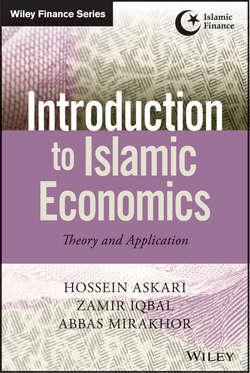Читать книгу Introduction to Islamic Economics - Mirakhor Abbas - Страница 16
На сайте Литреса книга снята с продажи.
Chapter 2
Foundation of the Islamic Economic Paradigm
Meta-Framework and Archetype of Economic Rules
ОглавлениеThe fountainhead of all Islamic paradigms is the Quran. It provides the framework within which all relevant envisioned conceptions of reality find their source. This eternal source specifies rules of behavior (institutions) applicable to all societies at all times. These rules are immutable temporally and spatially. The meta-framework specifies the immutable, abstract rules. The archetype model articulates the operational form of these rules and demonstrates how these rules are operationalized in a human community. The abstract became operational in the hands of the one human being who was the one and only direct recipient of the source of the meta-framework, the Quran. Through the words and actions of this perfect human, the meta-framework given by the Creator in the Quran was interpreted, articulated, and applied to the immediate human community of his time. The meta-framework specifies general universal laws, rules of behavior. The archetype model provides universal-specific rules of behavior and the institutional structure needed for organizing a human society based on the immutable rules of the meta-framework.
No one understood the Quran better than the Messenger (sawa), appointed to deliver it to humankind. During his blessed life on this plane of existence, he was both the spiritual and temporal authority for his followers. In his capacity as the spiritual authority, he expounded, interpreted, and explained the content of the Quran. In his capacity as the temporal authority, he operationalized the rules (institutions) specified in the Quran in the town of Medina. The economic system, which he established in Medina, is the archetype of Islamic economic systems. This archetype contains a core institutional structure that is immutable because it is firmly established based on the Messenger's (sawa) authoritative operationalization of the rules prescribed by the Creator in the Quran.
A typical example is the institution of inheritance. The specific procedure on how the inheritance is to be distributed is described in the Quran. There are also institutions that the Messenger (sawa) established which, while not explicitly stated in the Quran, are based on his understanding of the Quran as its highest interpretive authority. An example of this type of institution is the rules of market behavior. These two types of rules are immutable: Any conception of how an Islamic economy works will have to take these two elements of the archetype model as given. A third type of institutions at the periphery of the archetype model are temporally and spatially specific to the time and the place in which the archetype model was implemented. For example, the Messenger (sawa) instituted rules of noninterference with market forces and the need for unhindered flow of information in the market. This rule is of and itself an immutable rule of the archetype model, but forces that would interfere with market functioning may vary and are time and place dependent. For instance, before Islam, one acceptable method of interfering with market forces in Arabia was that middlemen would meet caravans bringing supplies some distance outside of the cities and purchase the supplies for resale in the cities. The Messenger (sawa) prohibited this procedure. Clearly, the principle of noninterference with the market forces is unchanged, but this particular procedure is no longer relevant. The economic hermeneutics of this rule and its application to a particular time, place, and market is part and parcel of what an Islamic economic paradigm would seek to address.
The meta-framework envisions an ideal society as one composed of believers committed to rule compliance. The individual members are aware of their “oneness” and conscious of the fact that their own self-interest is served by seeing “others as themselves.” Such a society is one of the “Golden Mean” that avoids extremes and is so rule compliant that it serves as a benchmark for and a witness to humanity (Quran 2:143). This is a society that actively encourages cooperation in socially beneficial activities and prohibits cooperation in harmful ones (Quran 3:104, 110, 114; 9:71). Moreover, in this society, consultation, both at the level of individual as well as the collectivity, is institutionalized in accordance with the rule prescribed by Allah (swt) (Quran 3:159; 42:38; 2:233). Similarly, all other rules of behavior prescribed in the Quran are institutionalized with sufficiently strong incentive structure to enforce rule compliance. The objective is the establishment of social justice in society.
